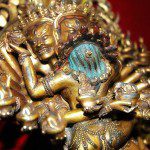A thirty-five page letter was issued yesterday by six of the closest attendants of Mipham Mukpo (Sakyong Mipham Rinpoche) detailing their experiences of verbal, physical and sexual abuse in vivid detail. Recollections include female students being “pushed to rationalize [sex] as a generous offering to their revered teacher”, stories of Mukpo hitting his attendants and forcibly biting people, students crying in a circle in their underwear, a culture of fear, and this is just the first of the six stories.
The accounts are made by members of Mr Mukpo’s innermost circle, members of the Dorje Kasung, described in the letter as “a quasi-military group in Shambhala tasked with protecting the teachings and the community. The Kusung, meaning “body protectors,” are a subset of the Dorje Kasung who are tasked with the direct care of Mr. Mukpo’s body, on all levels. Accordingly, the Kusung are witness to Mr. Mukpo’s private life.” Membership in this exclusive group is by invitation (by Mukpo) directly and requires, according to the signers of the letter, “loyalty, confidentiality, and allegiance.” The full letter can be downloaded here.
Wider issues in Tibetan Buddhism in the West
For those watching Tibetan Buddhism in the West, the letter will be reminiscent of the letter by eight of Sogyal Rinpoche’s former students in 2017. That letter, as noted in the Sydney Morning Herald, recounted, “Punching. Emotional abuse. Eye-popping sexual misdeeds. The accusations made against Sogyal Rinpoche – a key lama in the uptake of Buddhist principles by the West – have rocked devotees…”
Shortly after these eight students wrote there letter, H.H. the Dalai Lama spoke out on Buddhist teacher misconduct, specifically naming Sogyal, who had been close to the Dalai Lama. Yet this didn’t curb all accusations against the Dalai Lama for failing to address abuse in Tibetan Buddhism, as Sogyal’s abuse was known widely as early as 2011, when British journalist and former student Mary Finnegan wrote of Sogyal’s sexual exploitation of students. And, even before that, Finnegan wrote of a 1994-5 lawsuit by an unnamed California woman charging Sogyal of sexual harassment, coercion, and abuse.
Excerpts from Shambhala Buddhists near Sakyong Mukpo
In their introduction, the authors suggest that “Mr. Mukpo has has consistently shown a disturbing pattern of behavior” and that given Mukpo’s continued authority in Shambhala, they “feel a moral obligation to alert others in order to avoid further harm.”
In struggling to come to terms with their place in the abusive system, the authors write:
We know Mr. Mukpo received feedback about his behavior from various key people at different times. He either dismissed or was unable to heed the warnings and continued to engage in these activities. We are concerned that Mr. Mukpo is unlikely to change.
Most of us have been subjected to his abuse. At times we have also been inadvertent enablers of Mr. Mukpo’s behavior. We have each struggled to understand our blind spots. It is a bitter pill to swallow that we were enablers of this man… As was true for us, many other Shambhala leaders may not recognize their role in the propagation of these harms. Indeed many are victims themselves.
While we cannot undo the damage, hopefully we can speak to the truth of how his behavior has hurt many of his students. We seek to further validate those who have bravely named this pattern and who likely were subjected to gaslighting or minimization. We hope our personal statements will encourage others to speak and keep speaking.
A key to abuse: learning to discredit one’s own experience
The authors write of being told to obscure the line between Mukpo’s spiritual teachings and his abusive behavior, believing (as is common in much of Mahayana Buddhism) that the teacher’s “behavior is beyond our understanding.” They were asked, they say, to regard such [abusive] “activity as the guru’s method of waking us up.”
The authors display clarity about the ways that this and other ‘insider’ experiences in Shambhala have shaped their perceptions and led to bias in their understandings.
Ben Medrano, whose account runs 9 pages in length, reflects on the fear, sexual violence, and discussions with one of Chogyam Trungpa’s students who was, he says, “Knocked to the ground and kicked multiple times with boots on,” by Trungpa. He notes that:
For those familiar with the stories of the Karma Kagyu Buddhist lineage tracing back hundreds of years, these kinds of assaults are considered brilliant moments of teaching: a complex philosophical rationale of making lemonade out of lemons.
And he blames himself for not being able to turn Mukpo’s abuse into spiritual progress, realizing only in the letter that “my socialization into this tradition is the illogical root of this guilt.”
“I want my FUCKING Audi!”
A theme running through many of the accounts is the way that money was wasted by Mr Mukpo and his inner circle. Medrano writes of working for years for a $750/month stipend as resident physician and the disturbing relationship that Mukpo had to money.
“Repeatedly,” he writes, “I was amazed by the opulence, frequency, and duration of his luxury vacations.” On one occasion, “I recall a sober midday call demanding me to push for the unfeasible purchase of an Audi A8. I vividly remember his infuriated words being: “I want my FUCKING Audi!”
Shambhala’s culture of exploitation
Craig Mormon, who was part of Shambhala from 1995 to 2015, with much of that time well within the inner circles of the tradition, writes, “There is no way that I could possibly describe the entirety of Shambhala´s culture of exploitation and abuse in a short statement.”
Mormon was present for and witnessed certain parts of Mukpo’s alleged sexual assault of a woman in Chile while teaching there in 2002. That account is detailed in Andrea Winn’s Buddhist Project Sunshine (BPS) Report 3. Admitting that it was 15 years ago, Mormon recounts seeing the young woman go with Mukpo into a room and seeing a Shambhala student (now an Acharya or senior teacher) closing the door behind them. Later:
The woman came out of the room very upset. Somehow I wound up talking to her for a while on a balcony. She told me some of what had happened. I got the impression that Mr. Mukpo had forcefully tried to get her to have sex with him. I was not told that she had been locked-in, or that he had forced her to touch him. What she told me was bad enough, but she did not tell me that part.
I only remember pieces of the conversation, mostly of me trying to rationalize the behavior in some tantric sense while still trying to be supportive. Again, I feel shame.
According to independent investigator, Carol Merchasin, the Chile sexual assault is listed in the BPS Report 3 as a “key fact,” meaning allegations that are credible, have credible corroboration and are relevant to the allegations.
1. In 2002, the Sakyong sexually assaulted a woman in Chile and this assault was known to David Brown, Jesse Grimes, and Mitchell Levy.
Victim Blaming and Hypocrisy
Laura Leslie writes of her anger at the community, which seemed warm and understanding, but instead harbored a, “culture of abuse and rampant sexism [that] trickles down from Mr. Mukpo to all below him.”
Leslie describes herself as a Kusung-in-Training, a Shabchi (attendant to Mr. Mukpo’s wife), and holder of several other positions in Shambhala from 2002 to 2016. She wrote of meeting the President of Shambhala, a man in his 60’s:
He took hold of my arm, pulled me close, grabbed a strawberry, and while staring at my breasts, told me I was just as luscious as the fruit and how lucky were they that I was there to serve them. He stood with a male Acharya and the male leader of NYC Shambhala, all three laughed.
The President, the ‘civilian’ leader of Shambhala had just turned me into a sexual object and a joke. I was humiliated. Over the years I learned from other women that he frequently used his position of power to seduce and harass them.
She later recounts speaking to female leaders in Shambhala and being told, “in Vajrayana Buddhism male and female did not exist, therefore every day sexism was empty and if I practiced more I would see this.”
(Empty can refer to a key philosophical term in mostly Mahayana Buddhism, referring in part to the constructed nature of things so that we do not get too caught up on mistaken beliefs of their inherent existence.)
Leslie writes of leaving Shambhala in 2016 because, “Mr. Mukpo was abusive and I no longer thought that the community could change. Most of the men surrounding him knew it. Most of the men in leadership roles were either abusers themselves or witnessed it and silently endorsed it.”
Noting the Wickwire Holm investigation findings in which several allegations of abuse by Mukpo are confirmed, she says that the Interim Board of Shambhala immediately asked supporters for more money. “As far as I can see it’s business as usual: The victims will be placated, then pushed out, then silenced or discredited and the ‘King’ will shine hypocrisy from the throne… As long as people keep funding and supporting this power structure, there is no true motivation to change.”
No goodness or kindness without accountability and justice
Allya F. Canepa joined in 1992 to help with marketing and joined the Kusung-in-training program in 1994. She writes that:
At 36 I had convinced myself that I was out of harm’s reach because I managed to steer mostly clear of malignant personalities who seem to enjoy bad sex and late night drinking. Because both sides of my family had normalized and codified sexual, physical, and substance abuse for generations, I was an expert at reading between the lines. The context, the allowing blind eye, the inter-generational grooming, the abuse – it was all there. I came to Shambhala pre-groomed to see my brilliance as a gift for other and to fall into a kind of blank self-less persona when asked to serve. The only thing I was pretty clear about is that I thought alcohol was a problem. And I thought sex was a problem.
In her 25 years of service in Shambhala, she describes one incident in particular in which she was invited to Mr. Mukpo’s bedroom:
Being a Kusung I went immediately to kneel at his side of the bed and waited for his question or command. I was surprised when instead he put his hand down my shirt and fondled my breasts and said, “please I just want to sleep,” firmly directing my head to his cock. I obliged and shook it off. I buried and minimized my own experiences for over 20 years.
Mostly I didn’t tell anyone. Or I curtly summarized my experience as having been blessed enough to receive a “quarter cup of bindus” from my guru. I don’t know why I described it that way. It was the best I could do as my mind scrambled to relieve pressure from the melodic dissonance. In the Vajrayana we are taught that all body fluids, or pieces of clothing, tufts of hair, or leftover food from the guru’s plate are blessings gifted directly from the body of enlightenment. In the end, although I used those words to keep me from imploding, I was never able to discard my basic sense that this man had no idea, nor did he seem to care to have an idea, about how to create a shared space for intimacy.
Writing of her feelings today, she says she is not “in hearing the mantra of goodness and kindness being used to lull me into an altogether too familiar stupor. There is no goodness or kindness available here without accountability and justice. None.” She writes of seeing hundreds of women go in and out of Mr. Mukpo’s bedroom and often consoling them afterward.
Culture of Silence
Louis Fitch, who was a member from 2000-2016 and likewise held numerous roles in Shambhala, writes of regret.
I look back on that moment and I know that I am in part to blame for the harms he has caused. I wasn’t there for the abuses described in the Project Sunshine and Wickwire Holm reports but I know that every time I said nothing, I played my part.
And for that, I am deeply sorry.
Continuing, Fitch writes that some leaders in Shambhala still seem set on repairing the tradition:
But I look at my pretty uniform and my shiny pins and all I can see is a group of Shambhala Warriors ogling women. And I know that the sexual assault and abuses perpetrated in this community – scars that will never leave – is because people, including myself, didn’t say anything.
*** Updated 2/20/19, photo of “Sakyong receives gifts from students, 2005. Photo via Robertivanc, CC Flickr,” removed at request of owner.
*** Updated 2/20/19, as reported in Think Progress, leading teachers in Shambhala have issued an official letter responding to the above allegations. Their letter, available here, says in part that, “seeds of harmful and destructive behaviors became part of our Shambhala culture. Women in Shambhala experienced blatant sexism. Sadly, sexual misconduct, alcohol abuse, and abuse of power became all too prevalent. Over the years, we failed to address these issues directly as leaders and as a community, and therefore these seeds continued to ripen and produce further harm. As we are seeing in Shambhala, and in the larger social and political context, those things that have been habitually and collectively ignored are now coming to light.”
please join our community of patrons for $1/month













